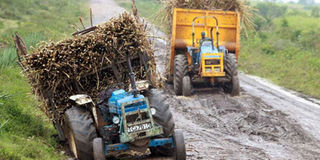Premium
Sugar industry is not a complete basket case

Tractors carrying sugarcane struggle to pass through bad roads on their way from farms to Muhoroni Sugar Company on September 12, 2016. PHOTO | TONNY OMONDI | NATION MEDIA GROUP
What you need to know:
The government needs to appoint competent managers and boards to run the factories the way businesses are supposed to be managed.
This will mean that the retrogressive practice of rewarding political cronies with positions they are ill-suited for will have to stop.
The report on the sugar industry that was recently published in the Daily Nation made grim reading.
I was once in Migori on some corporate social responsibility activities near the Sony Sugar factory. I spent a day with dozens of sugarcane farmers whose daily existence was marked by misery and hopelessness. This despite the fact that they owned hectares of sugarcane worth millions.
Why would anyone live in such poverty yet they own so much? The answer was simple. Most of the sugarcane crop in this area ranged in age from 36 to 60 months, yet the first crop of sugarcane ought to be harvested at 18 months at the latest. The opportunity cost was mind-boggling.
Hoping to transform their lives, most of the farmers had put their entire acreage under cane, leaving little or no room for subsistence crops. The result was perennial hunger, collapsing houses, disease, and children missing school.
I asked the farmers why they would not just clear the crop and take up other economic activities. Not that easy, it emerged. The contracts they have with the sugar company forbids the farmers from destroying the cane. Doing so would attract legal consequences that could sink the farmers further. Besides, most of them could not afford the cost of removing the cane.
HEART-WRENCHING EXPERIENCE
Despite this heart-wrenching experience, I was to become a sugarcane farmer years later. My cane was harvested a few weeks ago after a discouraging 36 months – 18 months late.
Let me put the magnitude of the loss in perspective. During those 36 months, I should have had at least two harvests and a third one would have been due in or around August next year. In financial terms, I should have earned money at least two times, with a significantly increased income from the second harvest. Yet it is three years since I started and I have not earned a penny. When I eventually do, it will be a significantly depressed income because older cane has less weight, hence reduced value.
Reports from the Sony sugar belt indicate that many people have quit sugarcane farming during the past three years while others have auctioned their crop to a nearby private factory. Therefore, Sony will likely suffer shortage of cane during the next few years. For this reason, as well as the fact that my lease is still active, I will not quit sugarcane farming just yet.
The industry is in bad shape, no doubt about that, but that, too, depends on whom you ask. The relative who influenced my decision to become a sugarcane farmer has a happy, heartwarming story because things seem to have worked for her.
BASKET CASE
I do not think the industry is a complete basket case. Yes, there are stories of neglect and poor management, high cost of production which has made locally produced sugar too expensive for the average consumer. Many of the country’s 11 sugar factories operate on ancient technology. Corruption thrives across the entire value chain. The government has failed to tame the sugar barons who flood the market with cheap imported tax-free sugar.
But I think there is hope that only needs political will to be realised. We have the option of privatising the government-owned factories, though politics may not allow this to happen soon.
In the meantime, the government needs to appoint competent managers and boards to run the factories the way businesses are supposed to be managed. This will mean that the retrogressive practice of rewarding political cronies with positions they are ill-suited for will have to stop.
Fred Gori is a communications specialist.





